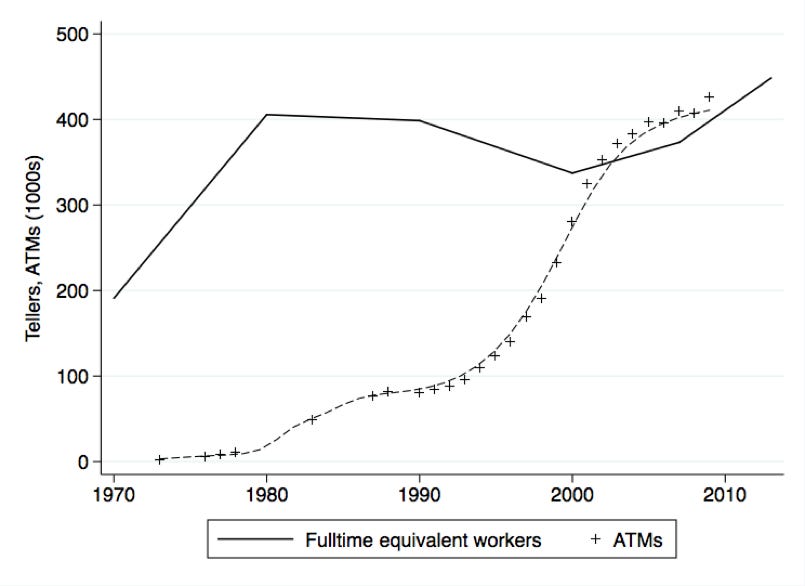The AI Reluctance Inside Companies—and Why It Might Be Misguided
Over the last few months, I've had dozens of conversations with people across industries - from startups to Fortune 500 - and a recurring pattern is clear: many employees are skeptical, if not outright resistant, to adopting AI tools in their day-to-day work. And it usually comes down to two things:
The hype hangover – AI feels like the next crypto. Flashy, confusing, and ultimately not that useful (yet).
The fear of obsolescence – “If this works, won’t I lose my job?”
These are real, human concerns. But the history of technology tells a different story. Take ATMs, for example. When they were introduced, everyone predicted bank tellers would disappear. But the opposite happened: bank employment actually grew, because ATMs reduced the cost of opening new branches, and more people started using banking services.

What’s happening inside companies
I recently spoke with a Principal Engineer at a Fortune 500 company with 30,000+ employees, most of them developers. Out of that massive pool? Only around 50–100 people are actively involved in AI-related initiatives or best-practice meetups.
That’s 0.3%.
Despite AI being on every slide deck and quarterly roadmap, the ground-level adoption is minimal.
Why?
“B2B clients require AI features, but refuse to enroll in beta test programs, so they turn to consultants and start develop something on their own”.
How to break the resistance (tips for businesses)
To shift perception, organizations need to make it really clear that AI isn’t about replacing people - it’s about helping them work better. (Think: 4-day workweeks, not pink slips.)
A few things that actually **work:
Create an AI ambassador network – Appoint 1–2 people in each function (design, product, marketing, dev, ops) to test-drive AI in real workflows. Let them become champions for their teams.
Start small with ROI-backed use cases – Pick a pain point that costs the business $10K+/month and try to solve it with AI. Tangible savings make skeptics curious.
Talk like a human, not a futurist – Don’t overpromise. AI isn’t going to run your company. But it can summarize meeting notes, write QA tests, or help a marketer ship 10x more content.
Not everyone can afford to ignore it (tips for individuals)
We’ve seen this before: modern farms, advanced factories, and digital businesses now produce far more with fewer people. But those displaced didn’t vanish - they transitioned, reskilled, or created new paths.
AI will do the same. Routine-heavy roles like basic QA, reporting, or customer support will shrink - not because they lack value, but because automation makes them more efficient.
At the same time, AI is the most accessible upskilling tool we’ve ever had. It can teach, coach, and co-create.
The transition won’t be painless. But early adopters gain the edge. Companies care about outcomes - more code, more ideas, more value. And the people who can deliver that at speed aren’t being replaced.
Every major technological revolution - from electricity to the internet - created more jobs than it destroyed. The challenge is always re-skilling fast.
Coders are skeptical, then hooked
AI is especially disruptive in software development. Many engineers resist it at first - they’re too busy, they’ve heard about hallucinations, they don’t trust it.
But that skepticism fades quickly after trying it. One teammate built an Android app over a weekend using AI, with zero prior experience. Another said it felt more like reviewing code than writing it.
AI shifts coding from "writing lines" to "reviewing, improving, guiding." Andrej Karpathy describes it as more collaborative and conversational than mechanical.
It won’t replace developers anytime soon, but it will accelerate them:
Faster prototyping and experimentation
Smoother entry into new languages
More leverage for senior engineers
It removes the language barrier between human and machine. But you still need to know what you're building.
And then… there’s Apple.
One of the most surprising stories I heard recently: developers at Apple aren’t allowed to use AI tools - at all. Security concerns. So instead of co-pilots and smart refactoring, they’re still trawling Stack Overflow (which, by the way, is in serious decline, source).
In a race where AI becomes the new literacy, not allowing your team to use it is like asking them to write code with their hands tied.
It’s not AI that replaces you…
There’s a temptation to see AI as either a massive disruptor or an overhyped trend. But in reality, it’s something in the middle: a transformational tool with plenty of rough edges that requires time, practice, and humility to master.
The faster you experiment, the faster you find the value. And the longer you ignore it, the harder the transition becomes.
Because no, you’re not being replaced by AI.
You’re being replaced by someone who knows how to use it better.


